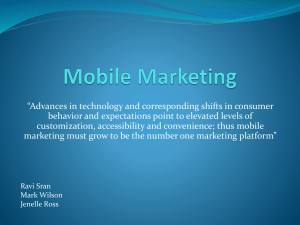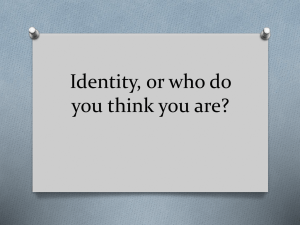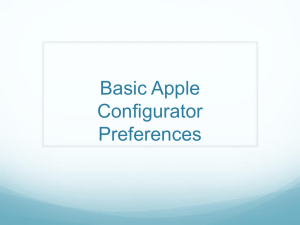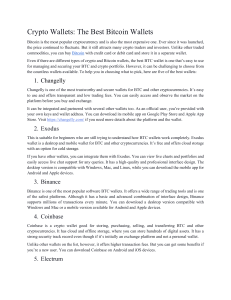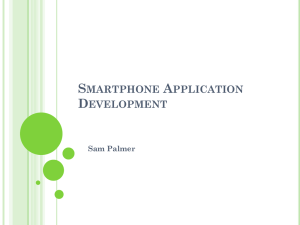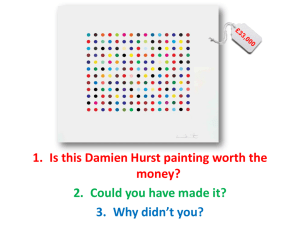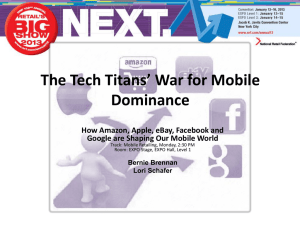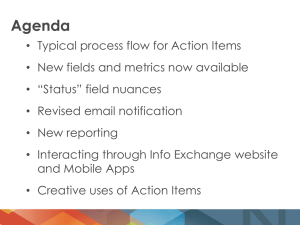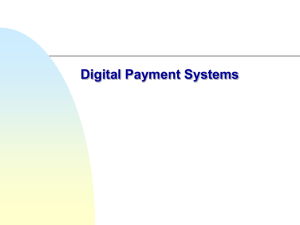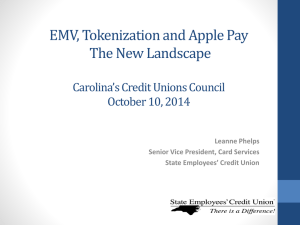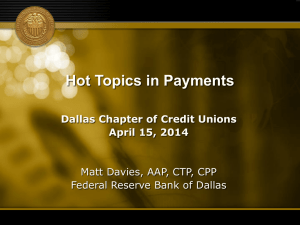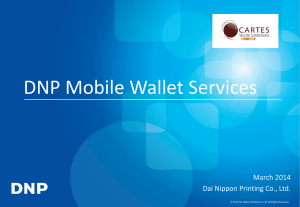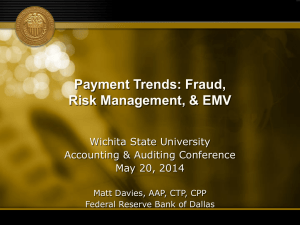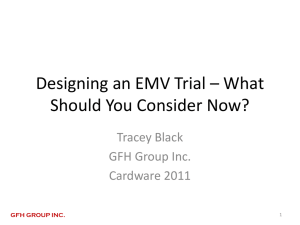ppt
advertisement
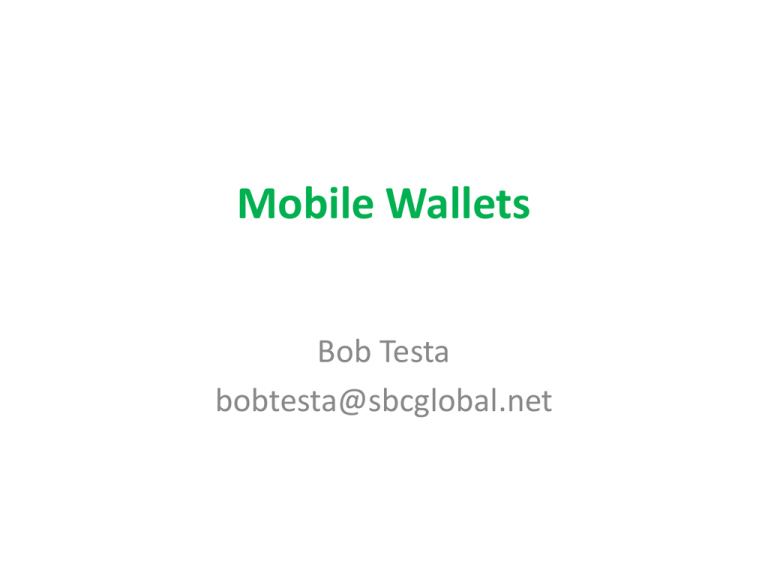
Mobile Wallets Bob Testa bobtesta@sbcglobal.net Internet Finance Management: Buying Things • How many of you have used a mobile device to pay for – An online purchase? – A purchase of physical goods? Kids Understand the New Paradigm How Should I Pay? Metal, Paper or Plastic? • We reach into our pockets for a leather wallet • We ask ourselves if we – should use metal, – paper or plastic. • And the answer is? Answer: It’s Complex and Becoming More So—Depends on the Seller • Traditional Check or its eCheck variant There Are Differences • Debit Card – Somewhat like an eCheck • Credit Card – Like getting a loan. Both customers & merchants get a loan. Smart Card—Already Overseas. Coming Soon to the US? Some Smart Card (EMV Chip) Facts • Encrypted credit cards are in various stages of use in over 80 countries. All EMV cards currently have a magnetic stripe too. • They tend to reduce but don’t eliminate fraud • Likely would not have prevented the Target breach • Card reader energizes the chip in the card, generating a unique code each time it is used; captured data cannot be used to execute new transactions • It doesn’t need to leave your possession • Investments in new terminals are expensive The Migration to Smart Cards • The US is one of the last countries to migrate to EMV • Requires 510 million new cards, millions of card readers & thousands of new ATMs at a cost of $8 Billion • Visa, M/C, Discover, Amex have plans to accelerate chip migration & adoption of mobile payments in US -Retailer incentives -Processing infrastructure acceptance req’mts -Counterfeit card liability shift -Fraud liability to shift as of October 2015 Leather Wallets Are Becoming Passé • Or so some would have you believe. There are new kids on the block! • Think credit card processing company or cell phone provider or someone else that stores your wallet on their secure servers, not in your pocket and not on your mobile device. Businesses Are Competing for Market Share More Recent Mobile Phone Statistics • 87% of US population has a mobile phone • 21% of mobile phone users used mobile banking within last 12 months – Transferring money directly to another person’s bank, credit card or PayPal account • Americans spent $12.8 Billion on mobile purchases in 2012 • By 2017, the expectation is $90 Billion will be spent on mobile purchases The Middlemen • Electronic payments industry is abuzz with the concept of mobile wallets; not hard to envision a world where a majority of transactions originate on a mobile device. • Market is still emerging; fragmented & confusing for both consumers & merchants. • The value-added proposition, especially from a consumer’s perspective, is somewhat unclear. • Consumers tend to gravitate towards convenience Thousands of Apps; More Coming • There are already thousands of payment processing options that function similarly. • Processes for disputing unauthorized charges vary, as do customer protection levels. • Most are generally free to you if you use a bank account or debit card – Costs to merchants vary. • May be a fee if credit card used to fund payments. • Some may sense your presence in a store automatically. – Maybe all you need is your mobile phone number and a pin. Or a finger print. Also Coming Soon or Here Now • Look for the Loop, the Fob, or a case with a chip—add-on devices containing an NFC chip • In an Apple Store, you can use an app, make an appointment, find a product & pay for it, all from your mobile device • Be on the lookout for Apple’s mobile payments entry based on iBeacon (using Blue Tooth Smart in lieu of an NFC chip), touch ID sensor (fingerprint), and something such as Passbook (and Passbook-enable apps) Apple’s Patent of a Few Weeks Ago • Mobile device includes secure element + wallet • Encrypted payment data sent to merchant • Merchant sends authorization request to a partner (credit card network) • Backend server validates payment info • Transaction is authorized only if payment info matches corresponding values (shared secret) known only to backend server A Tendency to Underestimate Apple • > 500 million iPhones & iPads sold to date. • Hundreds of millions of credit cards already on file in its iTunes store. • Finger print authentication and Passbook exists. • iBeacon unveiled last month. Think of it as a form of Electronic Barker that alerts apps when you approach or leave a location, using Blue Tooth Smart. • In-store experiences will be different by end of 2014. – Drive down a crowded city street & an available parking spot pings your phone. Or Safeway sends a reminder of when you last bought milk or beer as you approach the dairy or beverage aisle in one of its stores. Apple or Android? • Most of the myriad of existing apps are designed to turn your phone or tablet into your wallet. • It may be as simple as opening an app, tapping on store’s name, & scanning your device. That’s it! • Most generally work with both Apple & Android operating systems, though cell phone carrier or banking restrictions may limit their effectiveness. Some will only work with an NFC (near field communication) chip in the phone. • Some let you send money to anyone in the US with an email address. Now, at Starbucks, Both Apple & Android • Pay, check balance, reload your card, view history, transfer balances between cards • Add Starbucks Card to Passbook • Track Stars in rewards program • Send eGift to friend • Receive special offers • Find nearest Starbucks • Create & share beverages • Browse food & coffee menus Are Mobile Wallets Safe? • Immediate concern may be to think about security & identity theft. • Good News: Mobile processing uses same encryption as retail stores that swipe your debit or credit card. • Bad News: Talk to Target, Nieman-Marcus or Michaels customers as to how secure that is. • Major banks moving towards putting a fire wall between customer account info, merchants & other 3rd parties. Target may have failed to do this and got hacked. • Fallout from the Target breach: Retailers blame banks, banks blame retailers. How to Protect Yourself • • • • Use a pin number to activate your phone Download apps only from trusted sources Update your operating system regularly Conduct transactions only over a secure network (i.e. not over a public Wi-Fi hotspot) • Consider using security apps on your device • Resist the urge to jailbreak your device • Check your statements regularly Some Existing Mobile Processing Examples • Amazon Payments: Seamless experience and a massive user-base. You use info stored in your Amazon account to pay on thousands of other sites. No digging for your credit card or re-entering payment or shipping info. • Bill Me Later: Service by Pay Pal that provides access to 6-month financing. A reusable line of credit without the plastic. • clearXchange: Service from Bank of America, Chase & Wells Fargo. • Dwolla: Payment network that allows you to send, request, & accept money without relying on credit cards. • Google Wallet: Payment details are stored electronically, replacing the need for a traditional, physical wallet. Works anywhere you see the Buy with Google button. Examples (Continued)—There Are Thousands More • Intuit Payment Network: Bank-to-bank electronic funds transfer. • Isis Mobile Wallet: Made its debut last December as a joint venture between Verizon, T-Mobile & AT&T. Allows users to wave their phones at compatible cash registers. • Master Pass: MasterCard’s solution to streamline customer checkout. • PayPal: The 800-pound gorilla with 137+ million active registered accounts and >30 million US mobile customers. • Square: Payment processing app for Apple & Android phones. Acts like a mobile register. Enables you to accept payments too. • V.me: Visa’s mobile payment processing solution. The Holy Grail of the Mobile Wallet 1. Universally accepted by all merchants. 2. Includes multiple types of funding options (debit card, credit card, gift card, re-loadable card, ACH, provider funded accounts, delayed payment accounts). 3. Has built-in loyalty/rewards function. 4. Can be used for targeted coupons, daily deals, location & contextual advertising. 5. Interfaces with social media. 6. Provides rich data on consumer buying behaviors. • Can any one company or group of companies do it all? Some Final Thoughts • With thousands of payment-related apps available in the market today, can users virtually mimic all the functionalities of any of the apps & customize them to their own payment habits? • Are they secure enough? • Should we wait for what’s coming? The Way We Shop is Changing Dramatically • Register queues may diminish or be eliminated • Brick-and-mortar locations may become more viable for more small businesses • You may be able to surrender your bulging wallet and address one cause of your back pain • The cost of increased security will rise With Credit to Bob Dylan Come gather 'round people Wherever you roam And admit that the waters Around you have grown And accept it that soon You'll be drenched to the bone If your time to you Is worth savin' Then you better start swimmin' Or you'll sink like a stone For the times they are a-changin'. Whatever way you choose to pay, remember
